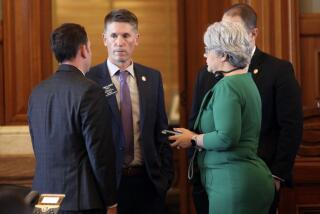Readers React: Christian groups should follow CSU rules on inclusiveness
To the editor: Requiring members of sectarian clubs sanctioned by public universities to submit to a religious test in order to be eligible for office is a frightening reminder of our theocratic-like colonial past. It represents a long tradition of intolerance that unabashedly continues to this day in several states where non-theists are barred from government service. (“Christian group fights for identity against Cal State policy,” Oct. 24)
Our state has charged its public universities with the secular purpose of exploring the entire range of thoughts and ideas, ultimately in the pursuit of knowledge, The endurance of an open institution depends on its ability to objectively deliberate informed alternatives.
We are all better served when university clubs, and society as a whole, seek to be all-inclusive. It is telling if they can’t be.
Alternatively, these clubs can still pay their own way and continue to exclude as they please.
Arthur D. Wahl, Port Hueneme
..
To the editor: Marginalizing groups like InterVarsity Christian Fellowship is quite concerning. I realize that the California State University system’s intention is to create an atmosphere in which there is no discrimination, but the policy ends up doing the very thing it seeks to prevent.
It may be true that a religious group does not have the right to government support of its beliefs, but does any campus group have that right?
I am sure there are plenty of student groups that foster beliefs and behaviors that I do not personally agree with, yet my tax money supports them. And I am happy that it does because I believe that our colleges and universities need to be places where people of different cultures and values listen and learn from one another.
In essence, Cal State is teaching students to be tolerant of everyone as long as they will submit to your beliefs.
Derek Engdahl, Pomona
..
To the editor: If there were ever a group that needs to ask “What would Jesus do?,” it is InterVarsity.
Even though it seeks to welcome believers and nonbelievers alike, InterVarsity is seeking an exemption from Cal State’s policy on inclusiveness so it can keep non-Christians out of its leadership while using free or discounted meeting rooms and funding from campus student associations.
What has happened to the age-old Christian tradition of “Come unto me, all ye that labor and are heavy laden,” or welcoming those who “thirst after righteousness”?
InterVarsity’s leaders could learn something about tolerance and “spreading the gospel” by attending a meeting of the Muslim Students’ Assn. at Cal State Long Beach. Its leader states that his group welcomes non-Muslims, many of whom are interested in learning about Islam.
June Maguire, Mission Viejo
Follow the Opinion section on Twitter @latimesopinion
More to Read
A cure for the common opinion
Get thought-provoking perspectives with our weekly newsletter.
You may occasionally receive promotional content from the Los Angeles Times.






